Sociological Analysis: Personal Is the Political Feminist Slogan
VerifiedAdded on 2023/04/03
|12
|2954
|351
Essay
AI Summary
This essay provides a comprehensive analysis of the feminist slogan 'Personal is the Political,' exploring its historical background, sociological context, and contemporary relevance. The essay begins by defining the slogan and its origins within the feminist movement, particularly the radical feminist faction. It then delves into the historical and sociological factors that led to the slogan's emergence, including the separation of the personal and public spheres and the rise of patriarchal structures. The essay examines the slogan's impact on issues such as domestic violence, sexual freedom, and women's rights, and its role in challenging patriarchal norms. Furthermore, the essay highlights the differences between liberal and radical feminism and how the slogan 'Personal is the Political' is associated with the radical feminist movement. The essay also discusses how the slogan provided a platform for marginalized women, including black women, to voice their concerns and interests. The essay concludes by emphasizing the continued relevance of the slogan in contemporary society, particularly in addressing gender inequality and advocating for social change. The essay draws on scholarly sources to support its arguments and offers a nuanced understanding of the slogan's significance within the broader context of feminist theory and activism.

Running head: PERSONAL IS THE POLITICAL
PERSONAL IS THE POLITICAL
Name of the Student
Name of the University
Author Note
PERSONAL IS THE POLITICAL
Name of the Student
Name of the University
Author Note
Paraphrase This Document
Need a fresh take? Get an instant paraphrase of this document with our AI Paraphraser
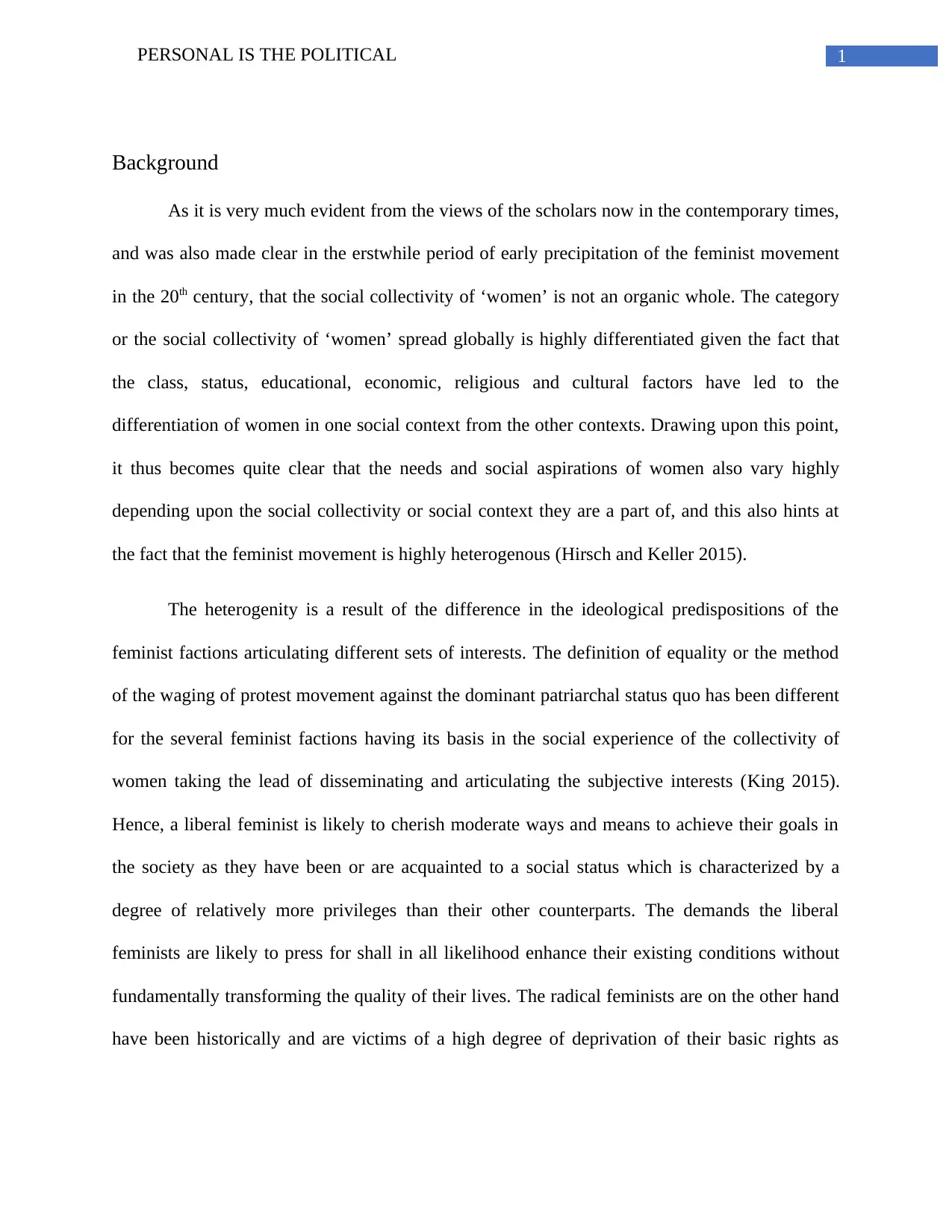
1PERSONAL IS THE POLITICAL
Background
As it is very much evident from the views of the scholars now in the contemporary times,
and was also made clear in the erstwhile period of early precipitation of the feminist movement
in the 20th century, that the social collectivity of ‘women’ is not an organic whole. The category
or the social collectivity of ‘women’ spread globally is highly differentiated given the fact that
the class, status, educational, economic, religious and cultural factors have led to the
differentiation of women in one social context from the other contexts. Drawing upon this point,
it thus becomes quite clear that the needs and social aspirations of women also vary highly
depending upon the social collectivity or social context they are a part of, and this also hints at
the fact that the feminist movement is highly heterogenous (Hirsch and Keller 2015).
The heterogenity is a result of the difference in the ideological predispositions of the
feminist factions articulating different sets of interests. The definition of equality or the method
of the waging of protest movement against the dominant patriarchal status quo has been different
for the several feminist factions having its basis in the social experience of the collectivity of
women taking the lead of disseminating and articulating the subjective interests (King 2015).
Hence, a liberal feminist is likely to cherish moderate ways and means to achieve their goals in
the society as they have been or are acquainted to a social status which is characterized by a
degree of relatively more privileges than their other counterparts. The demands the liberal
feminists are likely to press for shall in all likelihood enhance their existing conditions without
fundamentally transforming the quality of their lives. The radical feminists are on the other hand
have been historically and are victims of a high degree of deprivation of their basic rights as
Background
As it is very much evident from the views of the scholars now in the contemporary times,
and was also made clear in the erstwhile period of early precipitation of the feminist movement
in the 20th century, that the social collectivity of ‘women’ is not an organic whole. The category
or the social collectivity of ‘women’ spread globally is highly differentiated given the fact that
the class, status, educational, economic, religious and cultural factors have led to the
differentiation of women in one social context from the other contexts. Drawing upon this point,
it thus becomes quite clear that the needs and social aspirations of women also vary highly
depending upon the social collectivity or social context they are a part of, and this also hints at
the fact that the feminist movement is highly heterogenous (Hirsch and Keller 2015).
The heterogenity is a result of the difference in the ideological predispositions of the
feminist factions articulating different sets of interests. The definition of equality or the method
of the waging of protest movement against the dominant patriarchal status quo has been different
for the several feminist factions having its basis in the social experience of the collectivity of
women taking the lead of disseminating and articulating the subjective interests (King 2015).
Hence, a liberal feminist is likely to cherish moderate ways and means to achieve their goals in
the society as they have been or are acquainted to a social status which is characterized by a
degree of relatively more privileges than their other counterparts. The demands the liberal
feminists are likely to press for shall in all likelihood enhance their existing conditions without
fundamentally transforming the quality of their lives. The radical feminists are on the other hand
have been historically and are victims of a high degree of deprivation of their basic rights as
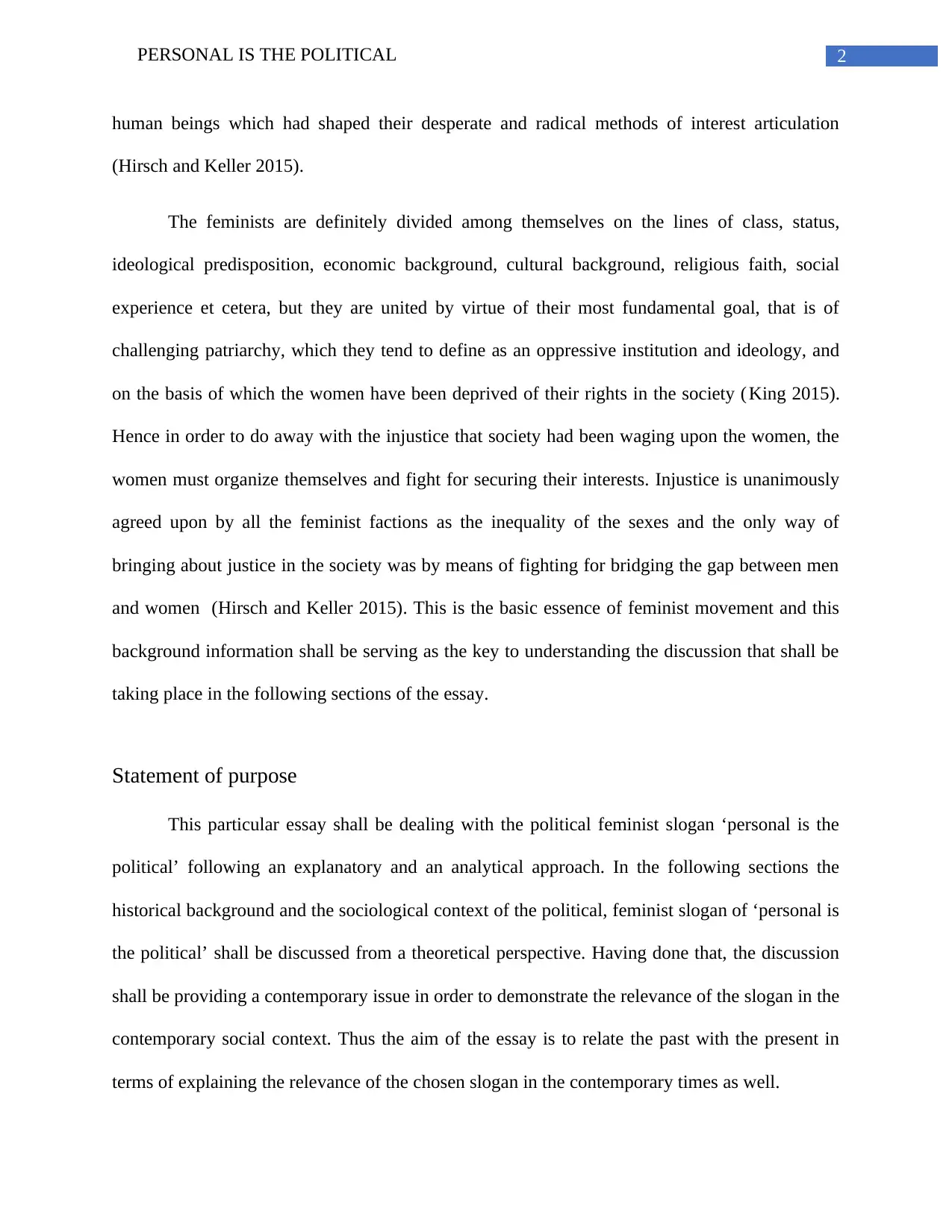
2PERSONAL IS THE POLITICAL
human beings which had shaped their desperate and radical methods of interest articulation
(Hirsch and Keller 2015).
The feminists are definitely divided among themselves on the lines of class, status,
ideological predisposition, economic background, cultural background, religious faith, social
experience et cetera, but they are united by virtue of their most fundamental goal, that is of
challenging patriarchy, which they tend to define as an oppressive institution and ideology, and
on the basis of which the women have been deprived of their rights in the society ( King 2015).
Hence in order to do away with the injustice that society had been waging upon the women, the
women must organize themselves and fight for securing their interests. Injustice is unanimously
agreed upon by all the feminist factions as the inequality of the sexes and the only way of
bringing about justice in the society was by means of fighting for bridging the gap between men
and women (Hirsch and Keller 2015). This is the basic essence of feminist movement and this
background information shall be serving as the key to understanding the discussion that shall be
taking place in the following sections of the essay.
Statement of purpose
This particular essay shall be dealing with the political feminist slogan ‘personal is the
political’ following an explanatory and an analytical approach. In the following sections the
historical background and the sociological context of the political, feminist slogan of ‘personal is
the political’ shall be discussed from a theoretical perspective. Having done that, the discussion
shall be providing a contemporary issue in order to demonstrate the relevance of the slogan in the
contemporary social context. Thus the aim of the essay is to relate the past with the present in
terms of explaining the relevance of the chosen slogan in the contemporary times as well.
human beings which had shaped their desperate and radical methods of interest articulation
(Hirsch and Keller 2015).
The feminists are definitely divided among themselves on the lines of class, status,
ideological predisposition, economic background, cultural background, religious faith, social
experience et cetera, but they are united by virtue of their most fundamental goal, that is of
challenging patriarchy, which they tend to define as an oppressive institution and ideology, and
on the basis of which the women have been deprived of their rights in the society ( King 2015).
Hence in order to do away with the injustice that society had been waging upon the women, the
women must organize themselves and fight for securing their interests. Injustice is unanimously
agreed upon by all the feminist factions as the inequality of the sexes and the only way of
bringing about justice in the society was by means of fighting for bridging the gap between men
and women (Hirsch and Keller 2015). This is the basic essence of feminist movement and this
background information shall be serving as the key to understanding the discussion that shall be
taking place in the following sections of the essay.
Statement of purpose
This particular essay shall be dealing with the political feminist slogan ‘personal is the
political’ following an explanatory and an analytical approach. In the following sections the
historical background and the sociological context of the political, feminist slogan of ‘personal is
the political’ shall be discussed from a theoretical perspective. Having done that, the discussion
shall be providing a contemporary issue in order to demonstrate the relevance of the slogan in the
contemporary social context. Thus the aim of the essay is to relate the past with the present in
terms of explaining the relevance of the chosen slogan in the contemporary times as well.
⊘ This is a preview!⊘
Do you want full access?
Subscribe today to unlock all pages.

Trusted by 1+ million students worldwide
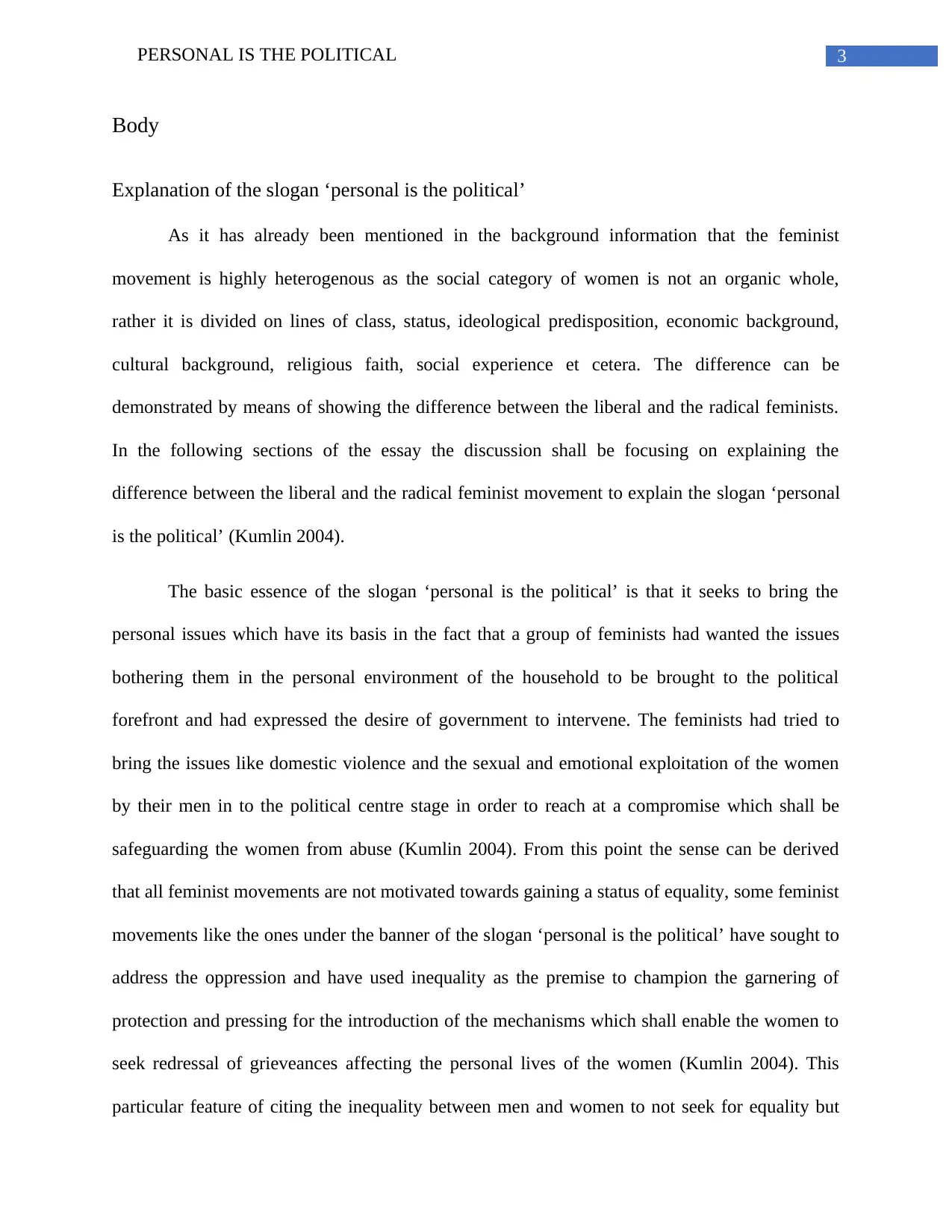
3PERSONAL IS THE POLITICAL
Body
Explanation of the slogan ‘personal is the political’
As it has already been mentioned in the background information that the feminist
movement is highly heterogenous as the social category of women is not an organic whole,
rather it is divided on lines of class, status, ideological predisposition, economic background,
cultural background, religious faith, social experience et cetera. The difference can be
demonstrated by means of showing the difference between the liberal and the radical feminists.
In the following sections of the essay the discussion shall be focusing on explaining the
difference between the liberal and the radical feminist movement to explain the slogan ‘personal
is the political’ (Kumlin 2004).
The basic essence of the slogan ‘personal is the political’ is that it seeks to bring the
personal issues which have its basis in the fact that a group of feminists had wanted the issues
bothering them in the personal environment of the household to be brought to the political
forefront and had expressed the desire of government to intervene. The feminists had tried to
bring the issues like domestic violence and the sexual and emotional exploitation of the women
by their men in to the political centre stage in order to reach at a compromise which shall be
safeguarding the women from abuse (Kumlin 2004). From this point the sense can be derived
that all feminist movements are not motivated towards gaining a status of equality, some feminist
movements like the ones under the banner of the slogan ‘personal is the political’ have sought to
address the oppression and have used inequality as the premise to champion the garnering of
protection and pressing for the introduction of the mechanisms which shall enable the women to
seek redressal of grieveances affecting the personal lives of the women (Kumlin 2004). This
particular feature of citing the inequality between men and women to not seek for equality but
Body
Explanation of the slogan ‘personal is the political’
As it has already been mentioned in the background information that the feminist
movement is highly heterogenous as the social category of women is not an organic whole,
rather it is divided on lines of class, status, ideological predisposition, economic background,
cultural background, religious faith, social experience et cetera. The difference can be
demonstrated by means of showing the difference between the liberal and the radical feminists.
In the following sections of the essay the discussion shall be focusing on explaining the
difference between the liberal and the radical feminist movement to explain the slogan ‘personal
is the political’ (Kumlin 2004).
The basic essence of the slogan ‘personal is the political’ is that it seeks to bring the
personal issues which have its basis in the fact that a group of feminists had wanted the issues
bothering them in the personal environment of the household to be brought to the political
forefront and had expressed the desire of government to intervene. The feminists had tried to
bring the issues like domestic violence and the sexual and emotional exploitation of the women
by their men in to the political centre stage in order to reach at a compromise which shall be
safeguarding the women from abuse (Kumlin 2004). From this point the sense can be derived
that all feminist movements are not motivated towards gaining a status of equality, some feminist
movements like the ones under the banner of the slogan ‘personal is the political’ have sought to
address the oppression and have used inequality as the premise to champion the garnering of
protection and pressing for the introduction of the mechanisms which shall enable the women to
seek redressal of grieveances affecting the personal lives of the women (Kumlin 2004). This
particular feature of citing the inequality between men and women to not seek for equality but
Paraphrase This Document
Need a fresh take? Get an instant paraphrase of this document with our AI Paraphraser
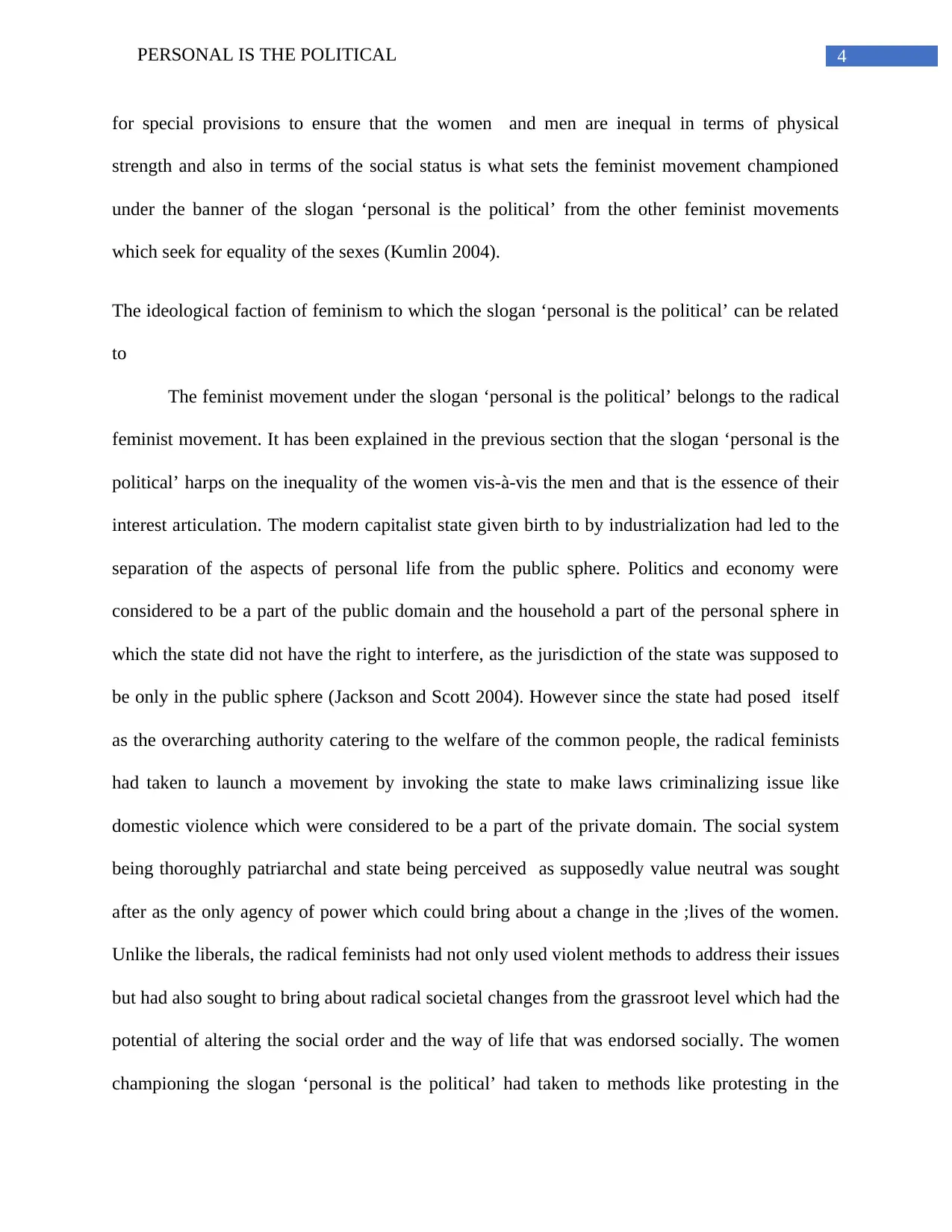
4PERSONAL IS THE POLITICAL
for special provisions to ensure that the women and men are inequal in terms of physical
strength and also in terms of the social status is what sets the feminist movement championed
under the banner of the slogan ‘personal is the political’ from the other feminist movements
which seek for equality of the sexes (Kumlin 2004).
The ideological faction of feminism to which the slogan ‘personal is the political’ can be related
to
The feminist movement under the slogan ‘personal is the political’ belongs to the radical
feminist movement. It has been explained in the previous section that the slogan ‘personal is the
political’ harps on the inequality of the women vis-à-vis the men and that is the essence of their
interest articulation. The modern capitalist state given birth to by industrialization had led to the
separation of the aspects of personal life from the public sphere. Politics and economy were
considered to be a part of the public domain and the household a part of the personal sphere in
which the state did not have the right to interfere, as the jurisdiction of the state was supposed to
be only in the public sphere (Jackson and Scott 2004). However since the state had posed itself
as the overarching authority catering to the welfare of the common people, the radical feminists
had taken to launch a movement by invoking the state to make laws criminalizing issue like
domestic violence which were considered to be a part of the private domain. The social system
being thoroughly patriarchal and state being perceived as supposedly value neutral was sought
after as the only agency of power which could bring about a change in the ;lives of the women.
Unlike the liberals, the radical feminists had not only used violent methods to address their issues
but had also sought to bring about radical societal changes from the grassroot level which had the
potential of altering the social order and the way of life that was endorsed socially. The women
championing the slogan ‘personal is the political’ had taken to methods like protesting in the
for special provisions to ensure that the women and men are inequal in terms of physical
strength and also in terms of the social status is what sets the feminist movement championed
under the banner of the slogan ‘personal is the political’ from the other feminist movements
which seek for equality of the sexes (Kumlin 2004).
The ideological faction of feminism to which the slogan ‘personal is the political’ can be related
to
The feminist movement under the slogan ‘personal is the political’ belongs to the radical
feminist movement. It has been explained in the previous section that the slogan ‘personal is the
political’ harps on the inequality of the women vis-à-vis the men and that is the essence of their
interest articulation. The modern capitalist state given birth to by industrialization had led to the
separation of the aspects of personal life from the public sphere. Politics and economy were
considered to be a part of the public domain and the household a part of the personal sphere in
which the state did not have the right to interfere, as the jurisdiction of the state was supposed to
be only in the public sphere (Jackson and Scott 2004). However since the state had posed itself
as the overarching authority catering to the welfare of the common people, the radical feminists
had taken to launch a movement by invoking the state to make laws criminalizing issue like
domestic violence which were considered to be a part of the private domain. The social system
being thoroughly patriarchal and state being perceived as supposedly value neutral was sought
after as the only agency of power which could bring about a change in the ;lives of the women.
Unlike the liberals, the radical feminists had not only used violent methods to address their issues
but had also sought to bring about radical societal changes from the grassroot level which had the
potential of altering the social order and the way of life that was endorsed socially. The women
championing the slogan ‘personal is the political’ had taken to methods like protesting in the
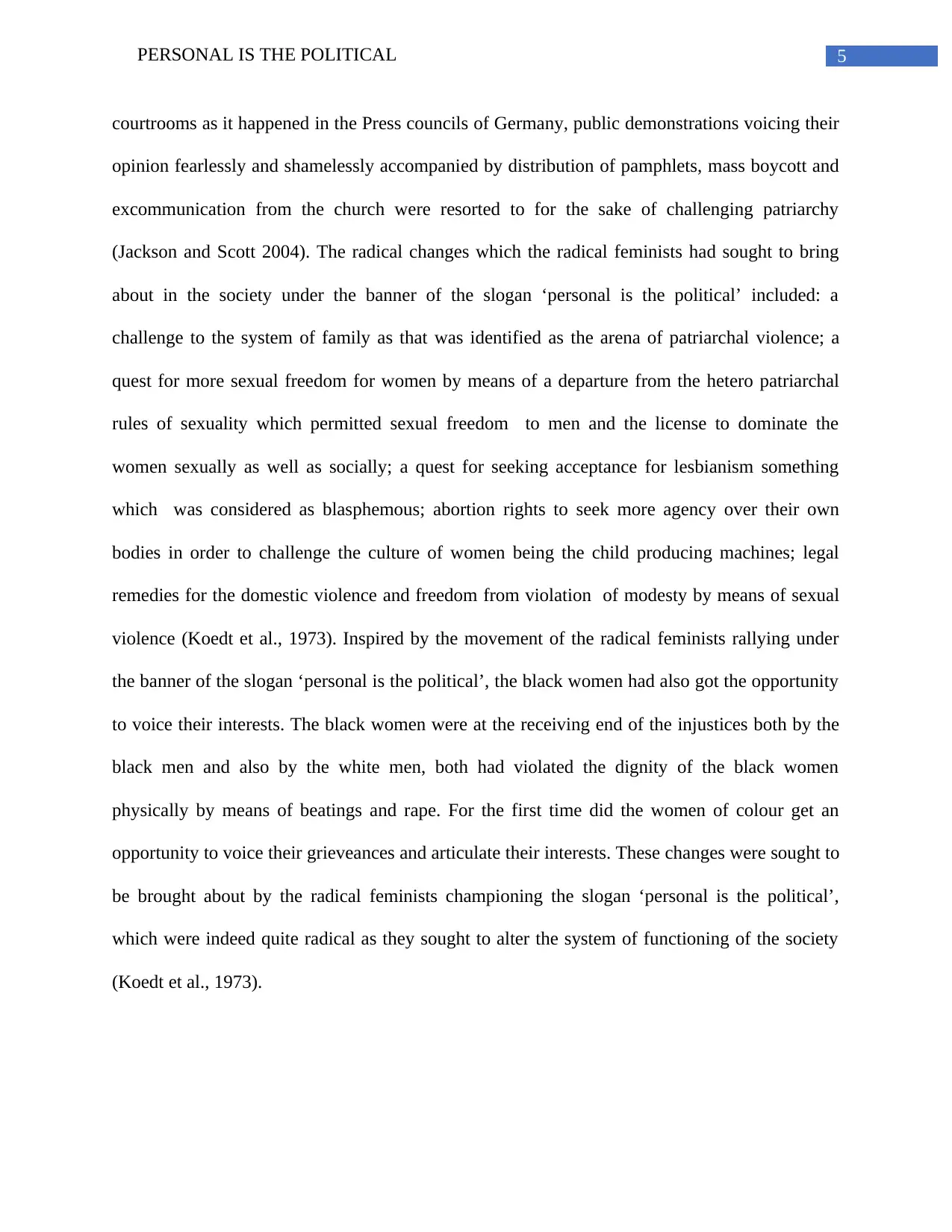
5PERSONAL IS THE POLITICAL
courtrooms as it happened in the Press councils of Germany, public demonstrations voicing their
opinion fearlessly and shamelessly accompanied by distribution of pamphlets, mass boycott and
excommunication from the church were resorted to for the sake of challenging patriarchy
(Jackson and Scott 2004). The radical changes which the radical feminists had sought to bring
about in the society under the banner of the slogan ‘personal is the political’ included: a
challenge to the system of family as that was identified as the arena of patriarchal violence; a
quest for more sexual freedom for women by means of a departure from the hetero patriarchal
rules of sexuality which permitted sexual freedom to men and the license to dominate the
women sexually as well as socially; a quest for seeking acceptance for lesbianism something
which was considered as blasphemous; abortion rights to seek more agency over their own
bodies in order to challenge the culture of women being the child producing machines; legal
remedies for the domestic violence and freedom from violation of modesty by means of sexual
violence (Koedt et al., 1973). Inspired by the movement of the radical feminists rallying under
the banner of the slogan ‘personal is the political’, the black women had also got the opportunity
to voice their interests. The black women were at the receiving end of the injustices both by the
black men and also by the white men, both had violated the dignity of the black women
physically by means of beatings and rape. For the first time did the women of colour get an
opportunity to voice their grieveances and articulate their interests. These changes were sought to
be brought about by the radical feminists championing the slogan ‘personal is the political’,
which were indeed quite radical as they sought to alter the system of functioning of the society
(Koedt et al., 1973).
courtrooms as it happened in the Press councils of Germany, public demonstrations voicing their
opinion fearlessly and shamelessly accompanied by distribution of pamphlets, mass boycott and
excommunication from the church were resorted to for the sake of challenging patriarchy
(Jackson and Scott 2004). The radical changes which the radical feminists had sought to bring
about in the society under the banner of the slogan ‘personal is the political’ included: a
challenge to the system of family as that was identified as the arena of patriarchal violence; a
quest for more sexual freedom for women by means of a departure from the hetero patriarchal
rules of sexuality which permitted sexual freedom to men and the license to dominate the
women sexually as well as socially; a quest for seeking acceptance for lesbianism something
which was considered as blasphemous; abortion rights to seek more agency over their own
bodies in order to challenge the culture of women being the child producing machines; legal
remedies for the domestic violence and freedom from violation of modesty by means of sexual
violence (Koedt et al., 1973). Inspired by the movement of the radical feminists rallying under
the banner of the slogan ‘personal is the political’, the black women had also got the opportunity
to voice their interests. The black women were at the receiving end of the injustices both by the
black men and also by the white men, both had violated the dignity of the black women
physically by means of beatings and rape. For the first time did the women of colour get an
opportunity to voice their grieveances and articulate their interests. These changes were sought to
be brought about by the radical feminists championing the slogan ‘personal is the political’,
which were indeed quite radical as they sought to alter the system of functioning of the society
(Koedt et al., 1973).
⊘ This is a preview!⊘
Do you want full access?
Subscribe today to unlock all pages.

Trusted by 1+ million students worldwide
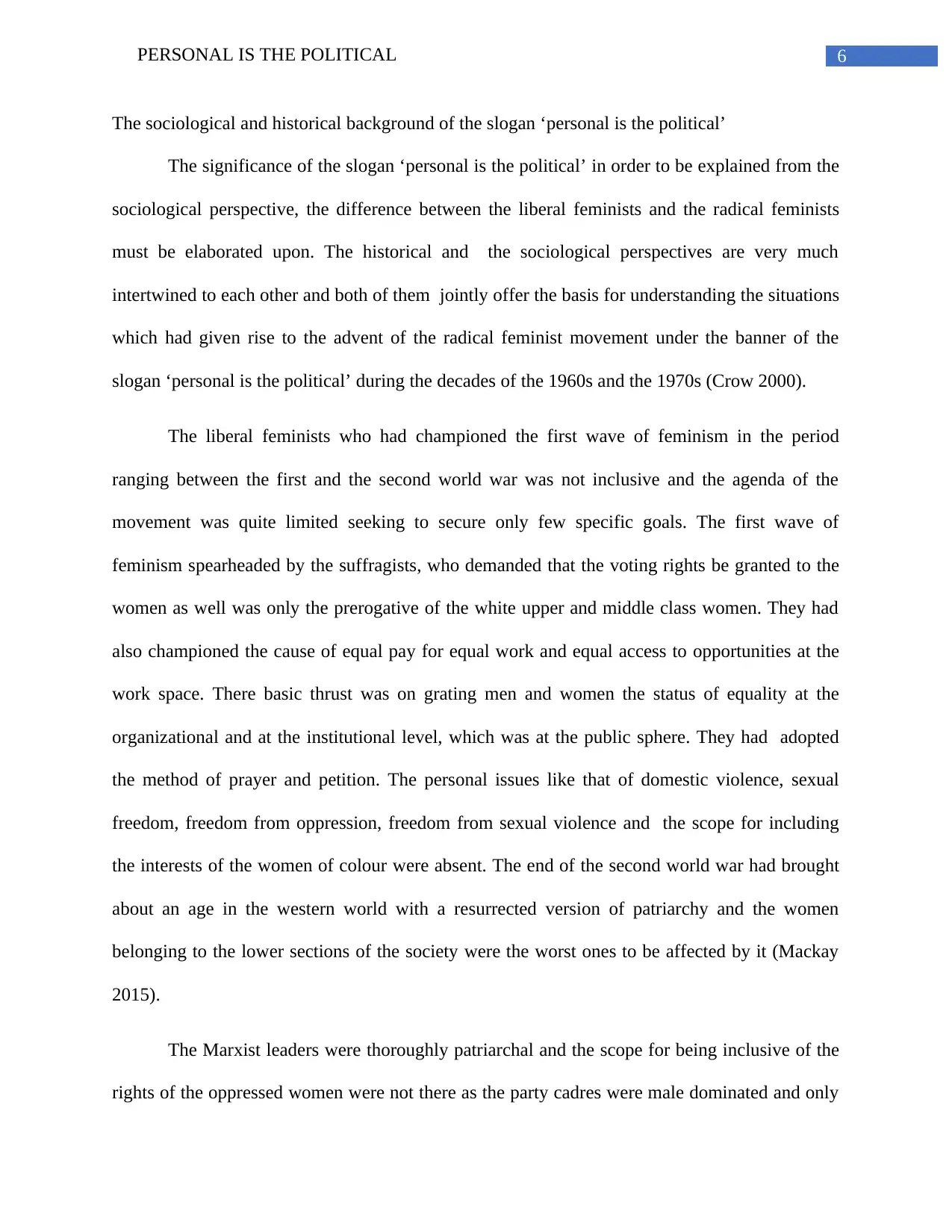
6PERSONAL IS THE POLITICAL
The sociological and historical background of the slogan ‘personal is the political’
The significance of the slogan ‘personal is the political’ in order to be explained from the
sociological perspective, the difference between the liberal feminists and the radical feminists
must be elaborated upon. The historical and the sociological perspectives are very much
intertwined to each other and both of them jointly offer the basis for understanding the situations
which had given rise to the advent of the radical feminist movement under the banner of the
slogan ‘personal is the political’ during the decades of the 1960s and the 1970s (Crow 2000).
The liberal feminists who had championed the first wave of feminism in the period
ranging between the first and the second world war was not inclusive and the agenda of the
movement was quite limited seeking to secure only few specific goals. The first wave of
feminism spearheaded by the suffragists, who demanded that the voting rights be granted to the
women as well was only the prerogative of the white upper and middle class women. They had
also championed the cause of equal pay for equal work and equal access to opportunities at the
work space. There basic thrust was on grating men and women the status of equality at the
organizational and at the institutional level, which was at the public sphere. They had adopted
the method of prayer and petition. The personal issues like that of domestic violence, sexual
freedom, freedom from oppression, freedom from sexual violence and the scope for including
the interests of the women of colour were absent. The end of the second world war had brought
about an age in the western world with a resurrected version of patriarchy and the women
belonging to the lower sections of the society were the worst ones to be affected by it (Mackay
2015).
The Marxist leaders were thoroughly patriarchal and the scope for being inclusive of the
rights of the oppressed women were not there as the party cadres were male dominated and only
The sociological and historical background of the slogan ‘personal is the political’
The significance of the slogan ‘personal is the political’ in order to be explained from the
sociological perspective, the difference between the liberal feminists and the radical feminists
must be elaborated upon. The historical and the sociological perspectives are very much
intertwined to each other and both of them jointly offer the basis for understanding the situations
which had given rise to the advent of the radical feminist movement under the banner of the
slogan ‘personal is the political’ during the decades of the 1960s and the 1970s (Crow 2000).
The liberal feminists who had championed the first wave of feminism in the period
ranging between the first and the second world war was not inclusive and the agenda of the
movement was quite limited seeking to secure only few specific goals. The first wave of
feminism spearheaded by the suffragists, who demanded that the voting rights be granted to the
women as well was only the prerogative of the white upper and middle class women. They had
also championed the cause of equal pay for equal work and equal access to opportunities at the
work space. There basic thrust was on grating men and women the status of equality at the
organizational and at the institutional level, which was at the public sphere. They had adopted
the method of prayer and petition. The personal issues like that of domestic violence, sexual
freedom, freedom from oppression, freedom from sexual violence and the scope for including
the interests of the women of colour were absent. The end of the second world war had brought
about an age in the western world with a resurrected version of patriarchy and the women
belonging to the lower sections of the society were the worst ones to be affected by it (Mackay
2015).
The Marxist leaders were thoroughly patriarchal and the scope for being inclusive of the
rights of the oppressed women were not there as the party cadres were male dominated and only
Paraphrase This Document
Need a fresh take? Get an instant paraphrase of this document with our AI Paraphraser
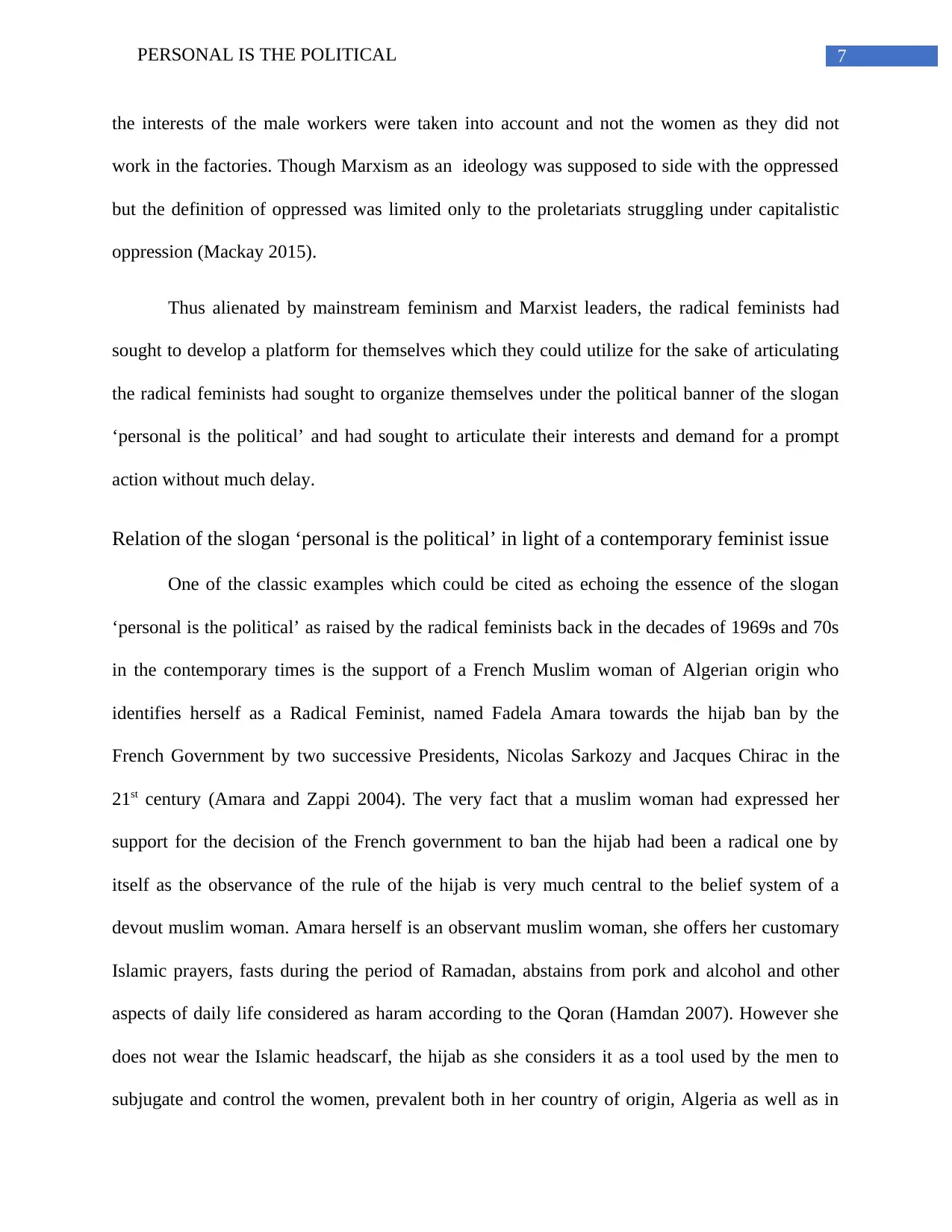
7PERSONAL IS THE POLITICAL
the interests of the male workers were taken into account and not the women as they did not
work in the factories. Though Marxism as an ideology was supposed to side with the oppressed
but the definition of oppressed was limited only to the proletariats struggling under capitalistic
oppression (Mackay 2015).
Thus alienated by mainstream feminism and Marxist leaders, the radical feminists had
sought to develop a platform for themselves which they could utilize for the sake of articulating
the radical feminists had sought to organize themselves under the political banner of the slogan
‘personal is the political’ and had sought to articulate their interests and demand for a prompt
action without much delay.
Relation of the slogan ‘personal is the political’ in light of a contemporary feminist issue
One of the classic examples which could be cited as echoing the essence of the slogan
‘personal is the political’ as raised by the radical feminists back in the decades of 1969s and 70s
in the contemporary times is the support of a French Muslim woman of Algerian origin who
identifies herself as a Radical Feminist, named Fadela Amara towards the hijab ban by the
French Government by two successive Presidents, Nicolas Sarkozy and Jacques Chirac in the
21st century (Amara and Zappi 2004). The very fact that a muslim woman had expressed her
support for the decision of the French government to ban the hijab had been a radical one by
itself as the observance of the rule of the hijab is very much central to the belief system of a
devout muslim woman. Amara herself is an observant muslim woman, she offers her customary
Islamic prayers, fasts during the period of Ramadan, abstains from pork and alcohol and other
aspects of daily life considered as haram according to the Qoran (Hamdan 2007). However she
does not wear the Islamic headscarf, the hijab as she considers it as a tool used by the men to
subjugate and control the women, prevalent both in her country of origin, Algeria as well as in
the interests of the male workers were taken into account and not the women as they did not
work in the factories. Though Marxism as an ideology was supposed to side with the oppressed
but the definition of oppressed was limited only to the proletariats struggling under capitalistic
oppression (Mackay 2015).
Thus alienated by mainstream feminism and Marxist leaders, the radical feminists had
sought to develop a platform for themselves which they could utilize for the sake of articulating
the radical feminists had sought to organize themselves under the political banner of the slogan
‘personal is the political’ and had sought to articulate their interests and demand for a prompt
action without much delay.
Relation of the slogan ‘personal is the political’ in light of a contemporary feminist issue
One of the classic examples which could be cited as echoing the essence of the slogan
‘personal is the political’ as raised by the radical feminists back in the decades of 1969s and 70s
in the contemporary times is the support of a French Muslim woman of Algerian origin who
identifies herself as a Radical Feminist, named Fadela Amara towards the hijab ban by the
French Government by two successive Presidents, Nicolas Sarkozy and Jacques Chirac in the
21st century (Amara and Zappi 2004). The very fact that a muslim woman had expressed her
support for the decision of the French government to ban the hijab had been a radical one by
itself as the observance of the rule of the hijab is very much central to the belief system of a
devout muslim woman. Amara herself is an observant muslim woman, she offers her customary
Islamic prayers, fasts during the period of Ramadan, abstains from pork and alcohol and other
aspects of daily life considered as haram according to the Qoran (Hamdan 2007). However she
does not wear the Islamic headscarf, the hijab as she considers it as a tool used by the men to
subjugate and control the women, prevalent both in her country of origin, Algeria as well as in
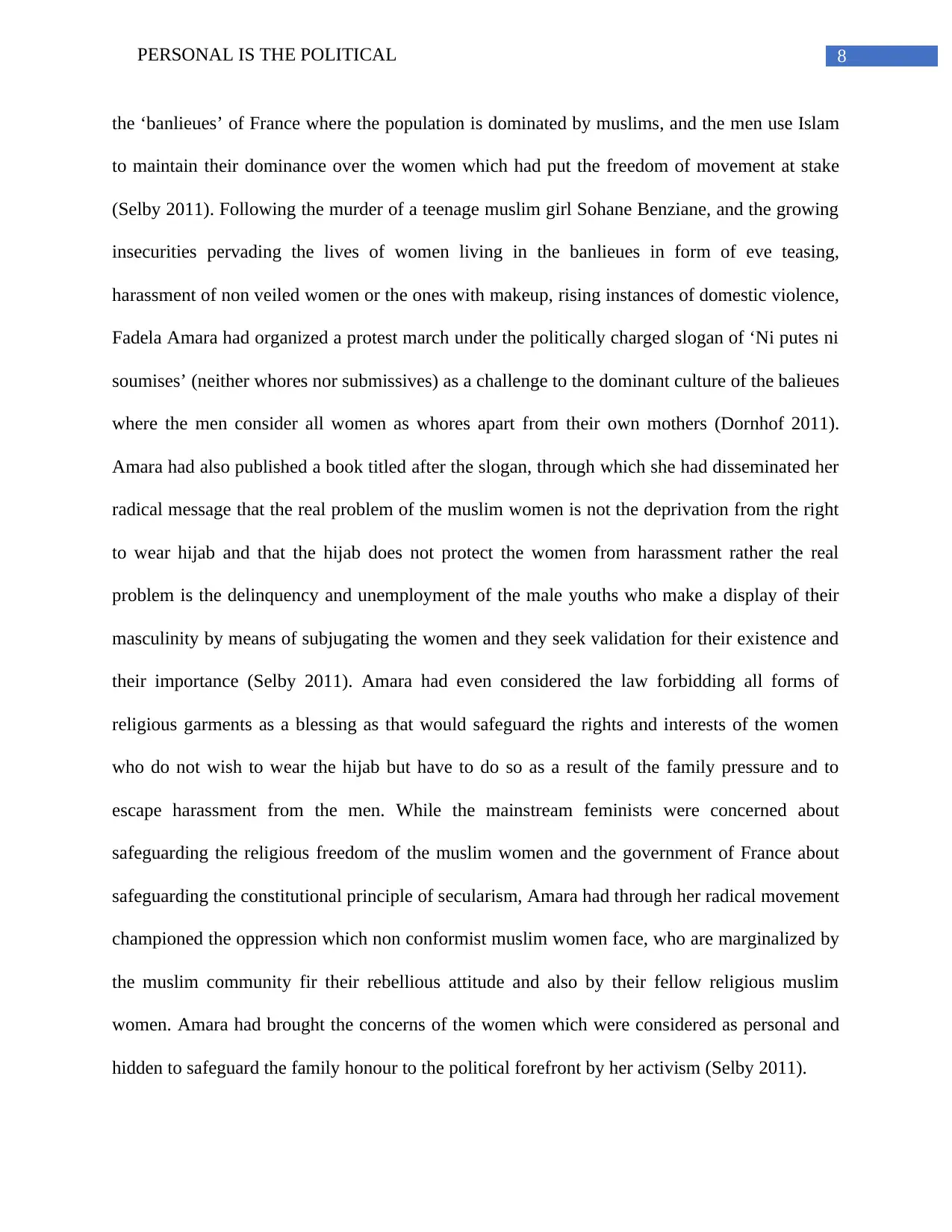
8PERSONAL IS THE POLITICAL
the ‘banlieues’ of France where the population is dominated by muslims, and the men use Islam
to maintain their dominance over the women which had put the freedom of movement at stake
(Selby 2011). Following the murder of a teenage muslim girl Sohane Benziane, and the growing
insecurities pervading the lives of women living in the banlieues in form of eve teasing,
harassment of non veiled women or the ones with makeup, rising instances of domestic violence,
Fadela Amara had organized a protest march under the politically charged slogan of ‘Ni putes ni
soumises’ (neither whores nor submissives) as a challenge to the dominant culture of the balieues
where the men consider all women as whores apart from their own mothers (Dornhof 2011).
Amara had also published a book titled after the slogan, through which she had disseminated her
radical message that the real problem of the muslim women is not the deprivation from the right
to wear hijab and that the hijab does not protect the women from harassment rather the real
problem is the delinquency and unemployment of the male youths who make a display of their
masculinity by means of subjugating the women and they seek validation for their existence and
their importance (Selby 2011). Amara had even considered the law forbidding all forms of
religious garments as a blessing as that would safeguard the rights and interests of the women
who do not wish to wear the hijab but have to do so as a result of the family pressure and to
escape harassment from the men. While the mainstream feminists were concerned about
safeguarding the religious freedom of the muslim women and the government of France about
safeguarding the constitutional principle of secularism, Amara had through her radical movement
championed the oppression which non conformist muslim women face, who are marginalized by
the muslim community fir their rebellious attitude and also by their fellow religious muslim
women. Amara had brought the concerns of the women which were considered as personal and
hidden to safeguard the family honour to the political forefront by her activism (Selby 2011).
the ‘banlieues’ of France where the population is dominated by muslims, and the men use Islam
to maintain their dominance over the women which had put the freedom of movement at stake
(Selby 2011). Following the murder of a teenage muslim girl Sohane Benziane, and the growing
insecurities pervading the lives of women living in the banlieues in form of eve teasing,
harassment of non veiled women or the ones with makeup, rising instances of domestic violence,
Fadela Amara had organized a protest march under the politically charged slogan of ‘Ni putes ni
soumises’ (neither whores nor submissives) as a challenge to the dominant culture of the balieues
where the men consider all women as whores apart from their own mothers (Dornhof 2011).
Amara had also published a book titled after the slogan, through which she had disseminated her
radical message that the real problem of the muslim women is not the deprivation from the right
to wear hijab and that the hijab does not protect the women from harassment rather the real
problem is the delinquency and unemployment of the male youths who make a display of their
masculinity by means of subjugating the women and they seek validation for their existence and
their importance (Selby 2011). Amara had even considered the law forbidding all forms of
religious garments as a blessing as that would safeguard the rights and interests of the women
who do not wish to wear the hijab but have to do so as a result of the family pressure and to
escape harassment from the men. While the mainstream feminists were concerned about
safeguarding the religious freedom of the muslim women and the government of France about
safeguarding the constitutional principle of secularism, Amara had through her radical movement
championed the oppression which non conformist muslim women face, who are marginalized by
the muslim community fir their rebellious attitude and also by their fellow religious muslim
women. Amara had brought the concerns of the women which were considered as personal and
hidden to safeguard the family honour to the political forefront by her activism (Selby 2011).
⊘ This is a preview!⊘
Do you want full access?
Subscribe today to unlock all pages.

Trusted by 1+ million students worldwide
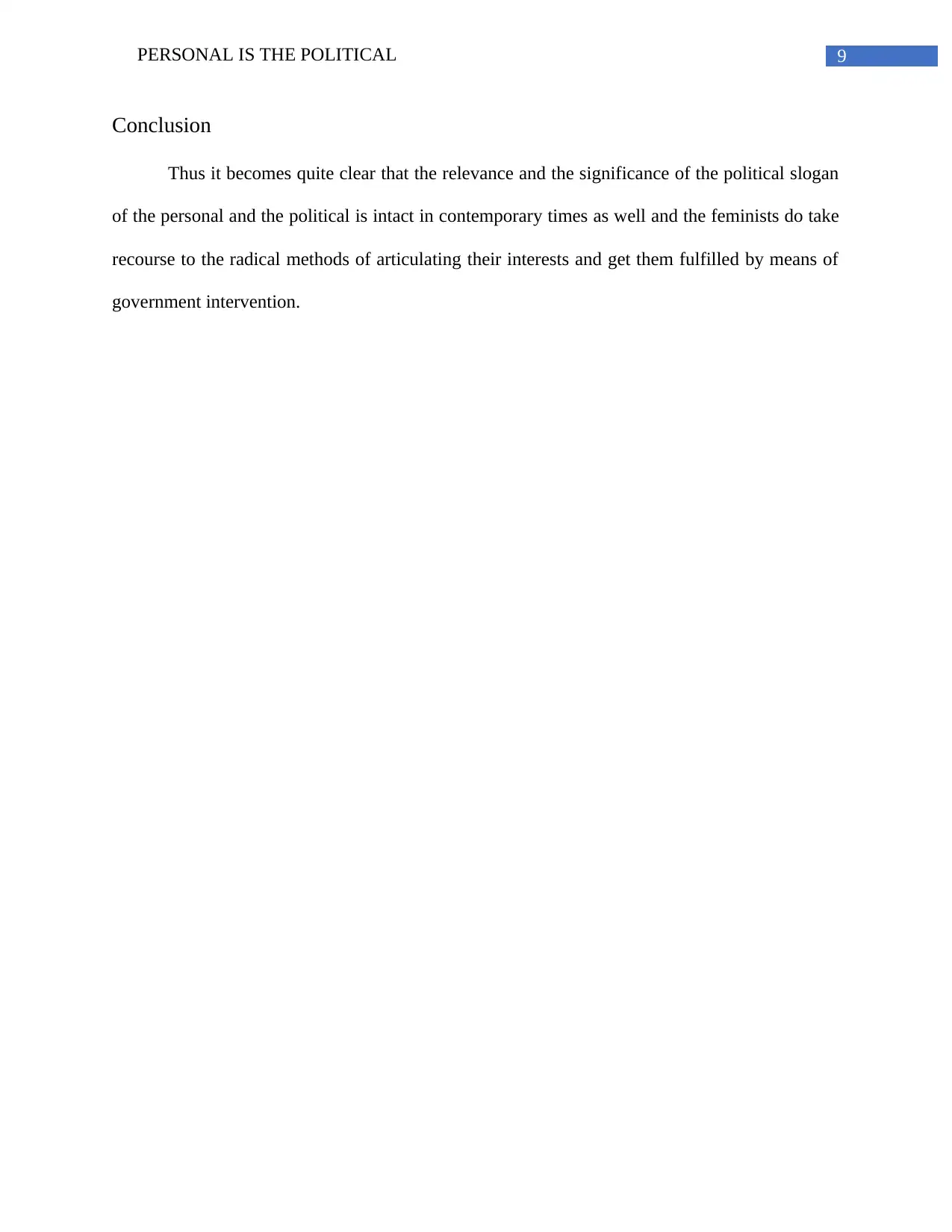
9PERSONAL IS THE POLITICAL
Conclusion
Thus it becomes quite clear that the relevance and the significance of the political slogan
of the personal and the political is intact in contemporary times as well and the feminists do take
recourse to the radical methods of articulating their interests and get them fulfilled by means of
government intervention.
Conclusion
Thus it becomes quite clear that the relevance and the significance of the political slogan
of the personal and the political is intact in contemporary times as well and the feminists do take
recourse to the radical methods of articulating their interests and get them fulfilled by means of
government intervention.
Paraphrase This Document
Need a fresh take? Get an instant paraphrase of this document with our AI Paraphraser
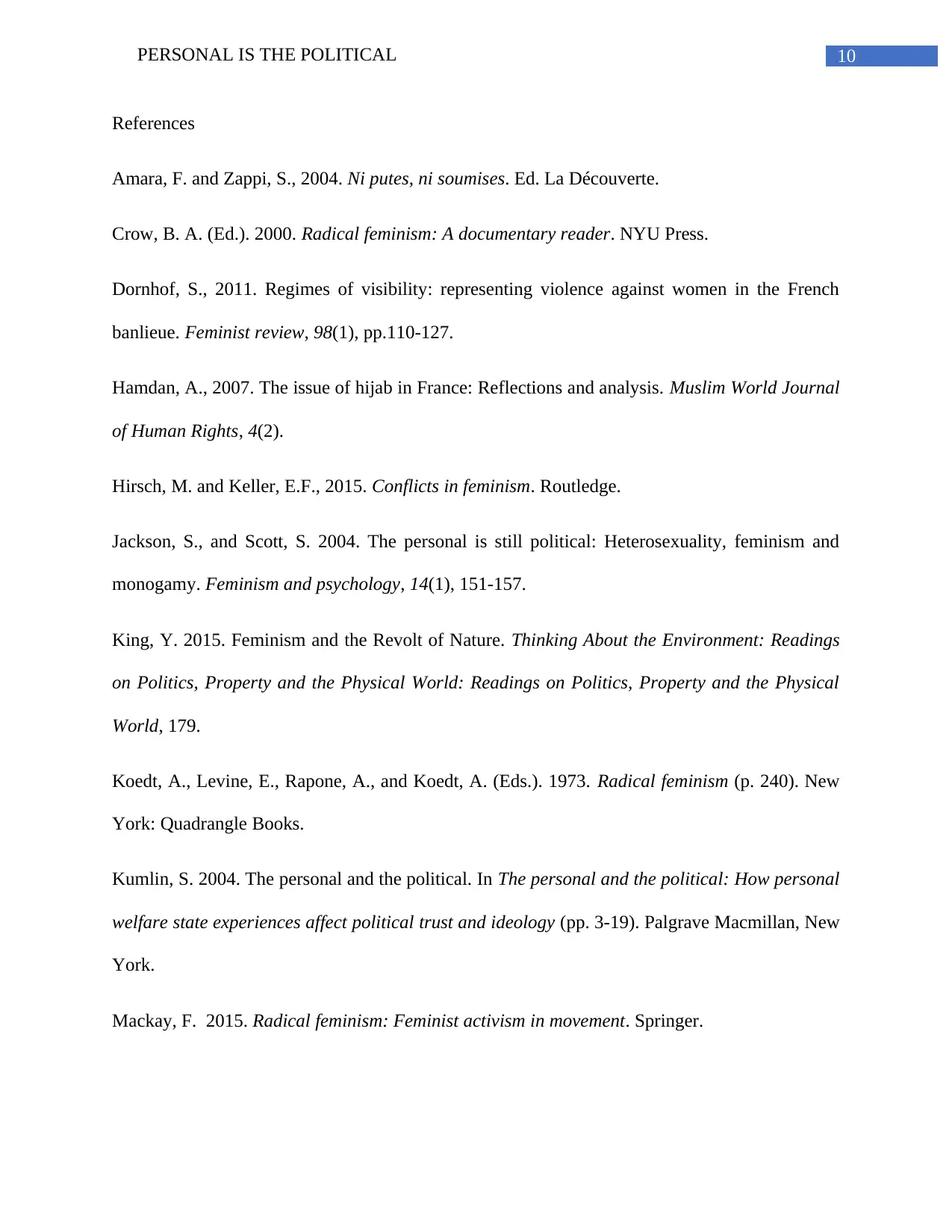
10PERSONAL IS THE POLITICAL
References
Amara, F. and Zappi, S., 2004. Ni putes, ni soumises. Ed. La Découverte.
Crow, B. A. (Ed.). 2000. Radical feminism: A documentary reader. NYU Press.
Dornhof, S., 2011. Regimes of visibility: representing violence against women in the French
banlieue. Feminist review, 98(1), pp.110-127.
Hamdan, A., 2007. The issue of hijab in France: Reflections and analysis. Muslim World Journal
of Human Rights, 4(2).
Hirsch, M. and Keller, E.F., 2015. Conflicts in feminism. Routledge.
Jackson, S., and Scott, S. 2004. The personal is still political: Heterosexuality, feminism and
monogamy. Feminism and psychology, 14(1), 151-157.
King, Y. 2015. Feminism and the Revolt of Nature. Thinking About the Environment: Readings
on Politics, Property and the Physical World: Readings on Politics, Property and the Physical
World, 179.
Koedt, A., Levine, E., Rapone, A., and Koedt, A. (Eds.). 1973. Radical feminism (p. 240). New
York: Quadrangle Books.
Kumlin, S. 2004. The personal and the political. In The personal and the political: How personal
welfare state experiences affect political trust and ideology (pp. 3-19). Palgrave Macmillan, New
York.
Mackay, F. 2015. Radical feminism: Feminist activism in movement. Springer.
References
Amara, F. and Zappi, S., 2004. Ni putes, ni soumises. Ed. La Découverte.
Crow, B. A. (Ed.). 2000. Radical feminism: A documentary reader. NYU Press.
Dornhof, S., 2011. Regimes of visibility: representing violence against women in the French
banlieue. Feminist review, 98(1), pp.110-127.
Hamdan, A., 2007. The issue of hijab in France: Reflections and analysis. Muslim World Journal
of Human Rights, 4(2).
Hirsch, M. and Keller, E.F., 2015. Conflicts in feminism. Routledge.
Jackson, S., and Scott, S. 2004. The personal is still political: Heterosexuality, feminism and
monogamy. Feminism and psychology, 14(1), 151-157.
King, Y. 2015. Feminism and the Revolt of Nature. Thinking About the Environment: Readings
on Politics, Property and the Physical World: Readings on Politics, Property and the Physical
World, 179.
Koedt, A., Levine, E., Rapone, A., and Koedt, A. (Eds.). 1973. Radical feminism (p. 240). New
York: Quadrangle Books.
Kumlin, S. 2004. The personal and the political. In The personal and the political: How personal
welfare state experiences affect political trust and ideology (pp. 3-19). Palgrave Macmillan, New
York.
Mackay, F. 2015. Radical feminism: Feminist activism in movement. Springer.

11PERSONAL IS THE POLITICAL
Selby, J.A., 2011. French secularism as a ‘guarantor’of women's rights? Muslim women and
gender politics in a Parisian banlieue. Culture and Religion, 12(4), pp.441-462.
Selby, J.A., 2011. French secularism as a ‘guarantor’of women's rights? Muslim women and
gender politics in a Parisian banlieue. Culture and Religion, 12(4), pp.441-462.
⊘ This is a preview!⊘
Do you want full access?
Subscribe today to unlock all pages.

Trusted by 1+ million students worldwide
1 out of 12
Related Documents
Your All-in-One AI-Powered Toolkit for Academic Success.
+13062052269
info@desklib.com
Available 24*7 on WhatsApp / Email
![[object Object]](/_next/static/media/star-bottom.7253800d.svg)
Unlock your academic potential
Copyright © 2020–2026 A2Z Services. All Rights Reserved. Developed and managed by ZUCOL.



